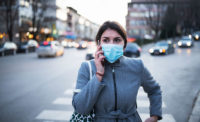Can face masks protect you from catching coronavirus?
Studies suggest they may provide some benefit, but what’s out there isn’t conclusive

As public health officials work to contain the mysterious, pneumonia-like virus that has gripped Asia, people are taking measures to protect themselves against the expanding outbreak.
The yet-unnamed coronavirus, a family of viruses that affect the respiratory tract, has killed 41 people and sickened more than 1,000 at last count, including a man in Washington state and woman in Chicago who both had recently traveled to Wuhan. The virus is believed to have started in a livestock market in Wuhan and jumped from animals to humans.
Asian pharmacies and health supply stores are reporting shortages as face masks fly off the shelves. In Wuhan City, Chinese authorities have encouraged people to wear masks in public, and Hong Kong airline Cathay Pacific Airways has permit cabin crew to wear surgical masks and provide them to passengers.
But do disposable face masks help to block the spread of viruses?
“Wearing a surgical mask to prevent infection is popular in many countries, most notably in China, where memories of SARS have helped fuel anxiety over the new coronavirus,” said Stephen Morse, professor of epidemiology at Columbia’s Mailman School of Public Health. “But there isn’t a lot of high-quality scientific research to gauge the effectiveness of masks and the results are mixed. Some studies suggest they may provide some benefit, but what’s out there isn’t conclusive.”
Surgical masks, also known as procedure masks, go back more than a century. They were designed to protect doctors and nurses in hospitals from spreading germs during operations or possibly catching infections from sick patients. Somewhere along the line, the public started using them. “Vintage photographs show both police officers and regular citizens wearing masks during Spanish flu pandemic of 1918,” Morse said. Several cities even had regulations requiring masks.
Controlled studies on the value of masks are difficult to carry out, and health agency guidelines are confusing and often contradictory. The Centers for Disease Control and Prevention doesn’t recommend masks for use by people without symptoms. The Occupational Safety and Health Administration (OSHA), however, advocates voluntary use as a “physical barrier to protect the user from hazards, such as splashes of large droplets of blood or body fluids.”
Conflicting research continues to fuel the debate. A University of Michigan study, for example, found that wearing masks and using alcohol-based hand sanitizers may prevent the spread of the influenza virus by as much as 50 percent.
Morse said the best evidence suggests that face masks catch the bacteria shed in liquid droplets, splashes or sprays, and virus-containing droplets, but are less effective in filtering out fine viral particles in the air.
But he doesn’t see any harm in people choosing to wear them. If you decide to do so, avoid the following problems that often occur.
- Wear the mask consistently, at least whenever there is any risk of infection. Many people find them uncomfortable and take them on and off, which renders them ineffective. Wash your hands after taking off the mask.
- Put the mask on correctly with a good fit covering your mouth and nose. Face masks will not provide protection from germs and other contaminants with loose fit between the surface of the face mask and your face.
- Don’t let it give you a false sense of security. “Wearing a mask doesn’t mean you should avoid tried and true hygiene practices,” Morse said. Wash your hands frequently, keep away from people who are coughing or sneezing, cover your coughs and sneezes (and wash hands afterwards), don’t touch your mouth nose, or eyes after touching an object that may be contaminated.)
- If you experience symptoms, such as cough, headache, fever, sore throat or a general feeling of being unwell, stay home.
The Food and Drug Administration has cleared certain filtering (face mask) respirators, known as N95s, for use by the general public, which is considered to provide greater protection. However, they are more difficult to wear and require a tighter fit to your face. If you are considering this, discuss it with your health care provider first.
Looking for a reprint of this article?
From high-res PDFs to custom plaques, order your copy today!






